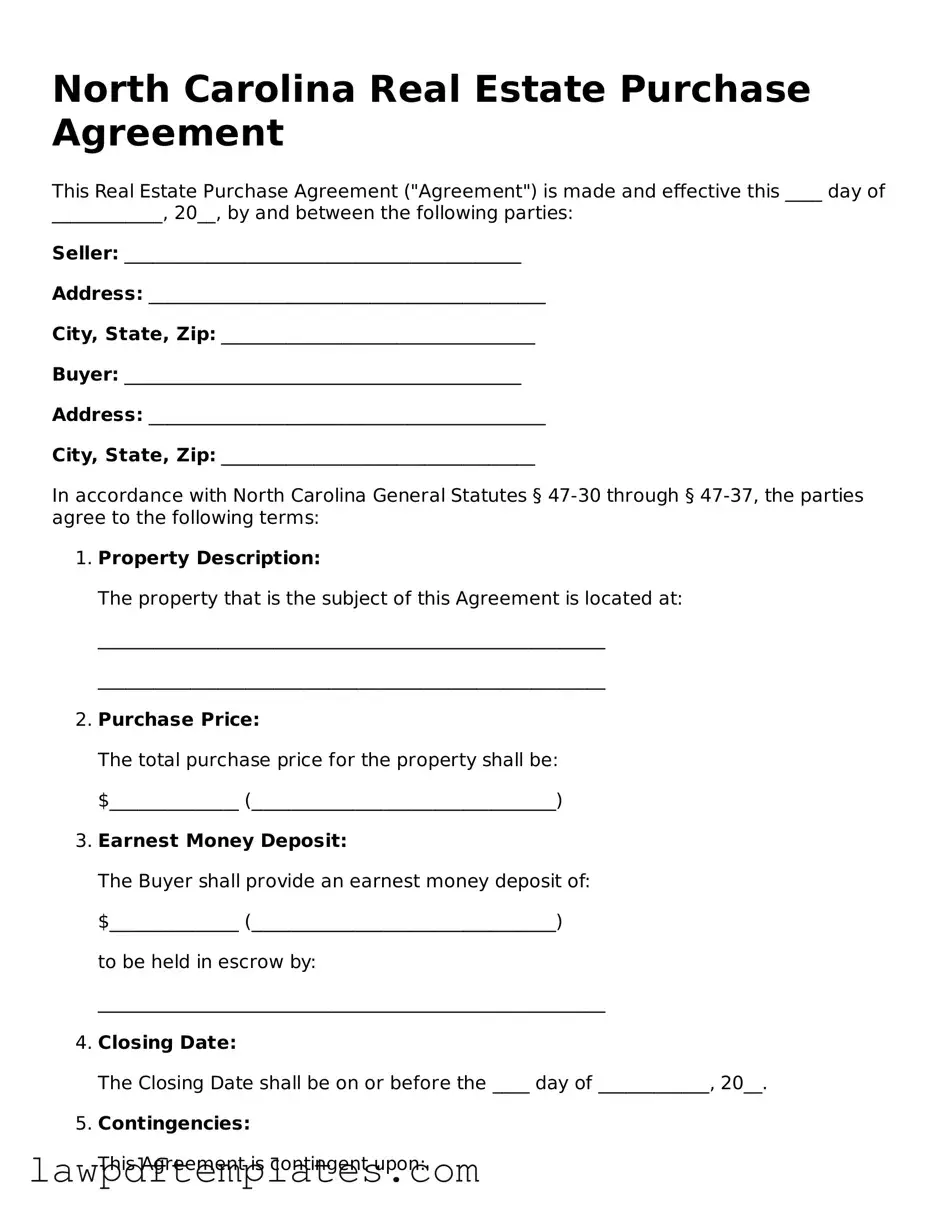Free Real Estate Purchase Agreement Template for the State of North Carolina
Form Breakdown
| Fact Name | Description |
|---|---|
| Purpose | The North Carolina Real Estate Purchase Agreement is used to outline the terms of a real estate transaction between a buyer and a seller. |
| Governing Law | This agreement is governed by North Carolina state laws, particularly the North Carolina General Statutes related to real property. |
| Parties Involved | The agreement identifies the buyer and seller, ensuring both parties are clearly defined to avoid confusion. |
| Property Description | A detailed description of the property being sold is included, which helps to specify exactly what is being transferred. |
| Purchase Price | The form specifies the purchase price, which is a crucial element of the agreement that both parties must agree upon. |
| Contingencies | Common contingencies, such as financing or inspection, are often included to protect the buyer's interests. |
| Closing Date | The agreement typically outlines a closing date, which is when the property transfer is finalized and ownership is officially transferred. |
Sample - North Carolina Real Estate Purchase Agreement Form
North Carolina Real Estate Purchase Agreement
This Real Estate Purchase Agreement ("Agreement") is made and effective this ____ day of ____________, 20__, by and between the following parties:
Seller: ___________________________________________
Address: ___________________________________________
City, State, Zip: __________________________________
Buyer: ___________________________________________
Address: ___________________________________________
City, State, Zip: __________________________________
In accordance with North Carolina General Statutes § 47-30 through § 47-37, the parties agree to the following terms:
- Property Description:
The property that is the subject of this Agreement is located at:
_______________________________________________________
_______________________________________________________
- Purchase Price:
The total purchase price for the property shall be:
$______________ (_________________________________)
- Earnest Money Deposit:
The Buyer shall provide an earnest money deposit of:
$______________ (_________________________________)
to be held in escrow by:
_______________________________________________________
- Closing Date:
The Closing Date shall be on or before the ____ day of ____________, 20__.
- Contingencies:
This Agreement is contingent upon:
- Financing approval
- Home inspection
- Other: ______________________________________________________
- Possession:
The possession of the property shall be delivered to the Buyer on the Closing Date.
- Governing Law:
This Agreement shall be governed by the laws of the State of North Carolina.
IN WITNESS WHEREOF, the parties hereto have executed this Real Estate Purchase Agreement as of the day and year first above written.
Seller's Signature: ___________________________ Date: _______________
Buyer's Signature: ___________________________ Date: _______________
This agreement is legally binding; each party should seek independent legal advice before signing.
Common mistakes
Filling out the North Carolina Real Estate Purchase Agreement can be a complex process, and mistakes can lead to significant issues later on. One common error is not providing accurate property information. Buyers and sellers must ensure that the legal description of the property is correct. Omitting details or providing incorrect data can cause confusion and may lead to disputes.
Another frequent mistake is failing to specify the terms of the offer clearly. This includes the purchase price, earnest money deposit, and closing date. If these terms are vague or missing, it can create misunderstandings between the parties involved. A well-defined agreement helps both buyers and sellers know their obligations and expectations.
Many individuals also overlook the importance of understanding contingencies. Contingencies are conditions that must be met for the sale to proceed. For instance, a buyer might want to include a contingency for a home inspection. Neglecting to add these clauses can leave buyers vulnerable to unexpected issues or expenses after the agreement is signed.
Lastly, some people forget to consult with professionals before finalizing the agreement. Real estate transactions often involve legal and financial complexities. Engaging a real estate agent or attorney can provide valuable guidance. Their expertise helps ensure that the agreement is comprehensive and complies with state laws.
Discover More Real Estate Purchase Agreement Templates for Specific States
Georgia Purchase and Sale Agreement 2023 - The document lays out the process for inspections and disclosures about the property’s condition.
In addition to grasping the essential elements of the Texas TREC Residential Contract form, it is also beneficial to seek resources that provide step-by-step assistance. For those looking to simplify their experience, detailed guidance is available at texasformspdf.com/fillable-texas-trec-residential-contract-online/, which can help ensure that all necessary information is accurately filled out and understood.
Real Estate Purchase and Sale Agreement - It can outline consequences if either party defaults on the agreement.
Home Purchase and Sale Agreement - It specifies who will conduct the closing and manage the transaction process.
